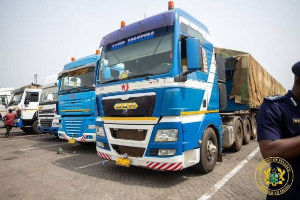Ghana’s digitalization agenda has become a cornerstone of its national development strategy, promising to modernize key sectors, enhance governance, and stimulate economic growth.
Through ambitious projects such as e-government platforms, mobile money services, and expanded broadband access, the country is positioning itself as a leader in Africa’s digital transformation. However, beneath these remarkable advancements lie socio-technical challenges that threaten to slow down progress if they are not addressed with urgency and precision.
These hidden issues spanning from digital inequality to regulatory gaps are not immediately visible in the success stories of tech innovation in Ghana. Yet, they are critical to the long-term sustainability of the digital economy.
Without addressing these challenges, Ghana risks creating a divided society where only a select few reap the benefits of digitalization, leaving large segments of the population behind.
The Digital Divide: A Widening Gap Between Urban and Rural Ghana
While major urban centers like Accra, Kumasi, and Takoradi boast expanding tech hubs and improved internet infrastructure, the same cannot be said for rural Ghana. Many remote communities still grapple with poor or non-existent internet connectivity, and in some cases, electricity remains unreliable or unavailable. This urban-rural digital divide is exacerbating existing inequalities and raising the question: who will truly benefit from Ghana’s digital revolution?
Digital access has become a basic need in today’s globalized world, yet in rural Ghana, access to the internet remains a luxury. According to the World Bank, only about 50% of Ghana’s population has access to the internet, with rural areas significantly lagging behind urban counterparts. The implications are far-reaching – from limited educational opportunities for students, to restricted access to healthcare information and e-government services for local residents.
Without substantial investment in rural infrastructure, including broadband expansion and stable electricity supply, these communities will be left out of the digitalization agenda. This could deepen the economic divide and limit opportunities for digital innovation in agriculture, a key sector in rural Ghana.
Digital Literacy: The Next Frontier
Access to digital tools is only half the battle. Ghana is also facing a significant gap in digital literacy, particularly among the elderly and rural populations. As digital services like mobile money, e-commerce, and e-health become more prevalent, the lack of skills needed to effectively use these tools presents a significant barrier to full participation in the digital economy.
Digital literacy is not just about being able to use a smartphone or computer. It extends to understanding online safety, recognizing the importance of data privacy, and navigating complex digital services.
A 2021 survey by the Ghana Statistical Service found that a significant proportion of the population, especially in rural areas, lack the skills to fully engage with digital services. This problem is more acute among women and older citizens, groups that already face socio-economic challenges in Ghanaian society.
Cybersecurity and Data Privacy: Underestimated Threats
As digitalization accelerates, so does Ghana’s exposure to cyber threats. Cybercrime is a growing concern, with increasing reports of phishing attacks, data breaches, and online fraud. According to the Cybercrime Unit of the Ghana Police Service, incidents of cyber fraud doubled between 2020 and 2022, highlighting the need for stronger cybersecurity measures.
The rapid digitization of public services, such as the Ghana Card system and e-government platforms, have introduced new vulnerabilities that cybercriminals are eager to exploit. Ghana’s cybersecurity framework, although improving, is still underdeveloped compared to global standards. More concerning is the low level of awareness about data protection and privacy rights among the general public.
Since the government passed the Data Protection Act in 2012, enforcement has been inconsistent, and many citizens are unaware of their rights. This situation leaves them vulnerable to exploitation by both cybercriminals and unscrupulous businesses that misuse personal data. Enhancing cybersecurity and ensuring widespread understanding of data privacy should be top priorities as Ghana’s digital economy grows.
Regulatory and Policy Gaps: The Need for Forward-Thinking Governance
Ghana’s digital transformation is unfolding at a rapid pace, but regulation and policy frameworks are struggling to keep up. Emerging technologies such as artificial intelligence (AI), blockchain, and the Internet of Things (IoT) are entering the mainstream, yet Ghana lacks comprehensive regulatory frameworks to govern their use. This creates significant risks in areas such as data ethics, consumer protection, and intellectual property rights.
For example, while AI is being adopted in sectors like health, finance, and education, there are no clear policies on how AI systems should be designed, used, and monitored. This could lead to issues such as biased algorithms, data misuse, and a lack of accountability for automated decisions that impact people’s lives.
Cultural Resistance: Bridging the Generational and Technological Divide
Despite the enthusiasm surrounding digital transformation, not all Ghanaians are embracing the shift. Cultural resistance to new technologies, especially among older generations, remains a significant barrier. Many older Ghanaians are skeptical of digital services, preferring traditional methods of banking, communication, and trade.
This cultural resistance is often rooted in mistrust and fear of the unknown. For example, some older citizens view mobile banking as risky and prefer cash transactions. Similarly, e-government platforms, while more efficient, are often viewed with suspicion by those accustomed to in-person interactions with public officials.
Changing these perceptions will require extensive public awareness campaigns, as well as efforts to build trust in digital systems. By addressing concerns and ensuring that digital services are accessible and user-friendly, Ghana can encourage broader adoption and reduce resistance.
Socioeconomic Barriers: Digitalization Risks Exacerbating Inequality
Economic barriers are another hidden issue that could undermine the digitalization agenda. For many Ghanaians, the cost of internet access, smartphones, and computers remains prohibitively high. This digital exclusion is most pronounced among low-income households, where the focus is often on basic necessities rather than digital connectivity.
The government’s efforts to promote digital inclusion through initiatives such as free Wi-Fi zones and affordable data packages are commendable, but more needs to be done. Without affordable access to devices and the internet, a significant portion of the population will remain excluded from the digital economy. This exclusion could widen the gap between the rich and poor, leading to greater social inequality.
Gender Disparity: Addressing the Digital Gender Gap
Women are significantly underrepresented in the tech and digital sectors in Ghana, which poses a threat to inclusive digital growth. According to the International Telecommunication Union (ITU), the digital gender gap in Sub-Saharan Africa remains a critical issue, with fewer women accessing and using the internet compared to men.
Infrastructure Reliability: A Persistent Challenge
Unstable power supply and unreliable internet connectivity are persistent issues that threaten the digitalization agenda. Power outages, a frequent occurrence in Ghana, can bring digital services to a standstill. Similarly, interruptions in internet service can affect businesses, disrupt government operations, and undermine confidence in digital systems.
Improving infrastructure reliability will require significant investment, not only in expanding access to electricity and Internet but also in ensuring that these services are dependable. Without a stable infrastructure, Ghana’s digital economy will struggle to gain traction, and the country risks falling behind in the global digital race.
The Way Forward: Building a Resilient Digital Future
For Ghana to achieve its digitalization goals, these socio-technical issues must be addressed with urgency. The government must prioritize expanding digital infrastructure to underserved areas, enhancing digital literacy across the population, and developing robust cybersecurity measures. Policies that promote gender inclusion in the digital space and encourage local tech innovation are essential for creating a more equitable digital economy.
Moreover, there must be a concerted effort to bridge the cultural and generational divide by fostering trust in digital systems and addressing the concerns of those who are hesitant to embrace new technologies. By tackling these hidden socio-technical challenges, Ghana can build a resilient digital future that benefits all citizens, fosters innovation, and strengthens its position as a digital leader in Africa.
Watch the latest edition of BizTech below:
Click here to follow the GhanaWeb Business WhatsApp channel
Business News of Friday, 27 December 2024
Source: Abubakari Saddiq Adams, Contributor













